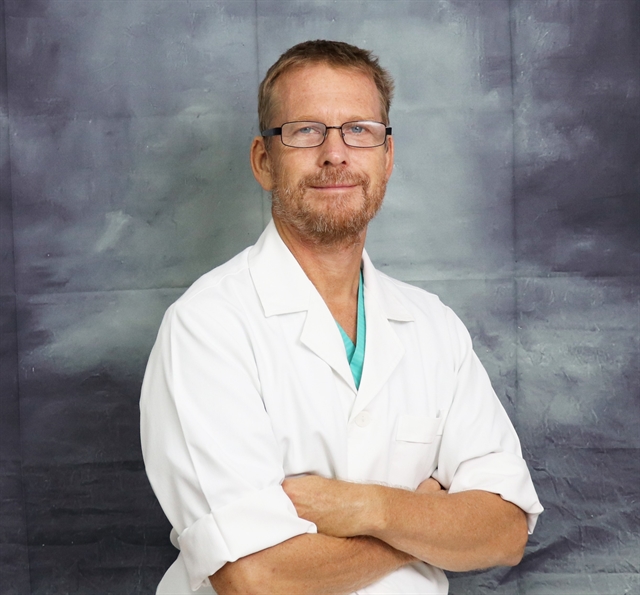 Life & Style
Life & Style


|
| Dr Mattias Larsson. Photo courtesy of Family Medical Practice |
Dr Mattias Larsson*
Tuấn is a lively five-year-old boy that goes to kindergarten, he is however often sick with cough and fever. His mother Hiền usually takes him to the local doctor who diagnoses throat infection, otitis media (ear infection) and bronchitis and prescribes antibiotics such as amoxicillin and klacid, as well as some steroids, cough syrup and vitamin C. When Hiền doesn’t have time to bring him to the doctor, she goes a private pharmacy and brings an old prescription, they provide the antibiotics and other medication needed. Tuấn usually improves after some days, and Hiền is satisfied.
However, on one occasion Tuấn did not improve after five days but got worse with difficulty breathing and high fever, and the local doctor referred him to the provincial hospital. Tuấn was diagnosed with pneumonia and was treated with IV antibiotics. He improved after some days and was planned for discharge when he relapsed with fever and deteriorated fast needing breathing support. The X-ray and tests showed that he had severe pneumonia, he needed a higher level of care and was referred to the central paediatric hospital.
When arriving Tuấn was in bad shape, he had rapid breathing and difficulty getting enough oxygen. He was intubated and admitted to the intensive care unit (ICU). They took many tests including blood and sputum cultures. Although he was treated with stronger IV antibiotics the fever did not decrease. The cultures showed that he had blood stream infection with a superbug, Carbapenem Resistant Enterobacteriaceae (CRE). The doctor explained that this bacteria is resistant to almost all types of antibiotics, and that it spreads in hospitals causing severe infections.
During my time working in Việt Nam I have witnessed how the overuse of antibiotics has caused increasing antibiotic resistance, more severe illness and death. When I first came to Việt Nam in 1997 I did my PhD on antibiotic use and resistance. In a study outside Hà Nội we found that 75 per cent of the children had used antibiotics within the last month, mostly through self-medication purchased from private pharmacies, and the most common cause was for viral respiratory infections. With the use of antibiotics, vulnerable bacteria are killed while resistant bacteria survive. Extensive antibiotic use can result in the emergence of antibiotic-resistant bacterial strains. We repeated the study several times and found a slight decrease of antibiotic use but increase of resistance.
In another study in 16 hospitals we found a high rate of hospital acquired infections (HAI) with superbugs as CRE in ICU’s. In neonatal ICU more than half of infants with superbug infections died. Half of all patients screened in 12 hospitals were colonised with CRE superbugs, and after two weeks of in-hospital care it was 90 per cent, with a significant correlation between being CRE colonised, HAI and mortality. We also did studies for early detection of CRE colonisation through admission screening and found that isolation through cohort care among about 1,000 patients could decrease acquisition (becoming colonised during hospital care) from 90 per cent to 45 per cent.
If there is a high rate of CRE colonisation at discharge from hospitals, there is a risk that the bacteria spreads in households through transmission between family members and then to the community in schools and workplaces. The CRE bacteria is colonising the gastrointestinal tract and can spread through faeces that contaminates food and water. Hygiene is very important to prevent transmission.
Another less resistant superbug, ESBL, has already spread out. It causes urinary infections that are increasingly difficult to treat with oral antibiotics. If CRE is spread further, treatment will become even more difficult. We now have a project to assess if CRE transmission both in hospital and from CRE colonised children to household members can be decreased through better hygiene and less unindicated antibiotic use.
World AMR Awareness Week (November 18-24) is an annual global campaign to improve antibiotic awareness and encourage best practices among policymakers, health care staff and to reduce the further emergence and spread of AMR.
So, what can you do? When seeking healthcare, go to a clinic that has good clinical and laboratory capacity. Don’t self-medicate with antibiotics. Think twice. Seek advice. Antibiotics aren't always the answer. Antimicrobial Resistance: no action today equals no cure tomorrow.
And what happened to Tuấn? As he came to a central hospital in time with a microbiological capacity that could culture CRE and assess the resistance pattern, the correct and effective treatment could be found. Three weeks later he was discharged and is now back in school and full of energy! Family Medical Practice
*Dr Mattias Larsson is a paediatric doctor at Family Medical Practice and associate professor at Karolinska Institutet and has a long experience in research on infectious diseases, especially antibiotic resistance and hospital-acquired infections as well as HIV, with many articles in peer-reviewed publications and mainstream media appearances.
He has worked with the Oxford University Clinical Research Unit, USAID, the Clinton Foundation, and the Ministry of Health of Việt Nam. He is fluent in English, Swedish, Vietnamese, German and some Spanish.
Visit Family Medical Practice Hanoi 24/7 at 298 I Kim Mã St, Kim Mã Ward, Ba Đình Dist.
To book an appointment, please call us at (024).3843.0784 or via Whatsapp, Viber or Zalo on +84.944.43.1919 or email hanoi@vietnammedicalpractice.com.
FMP’s downtown Hồ Chí Minh City location is in Diamond Plaza, 34 Đ Lê Duẩn St, Bến Nghé Ward, District 1, and 95 Đ Thảo Điền, District 2. Tel. (028) 3822 7848 or email hcmc@vietnammedicalpractice.com.